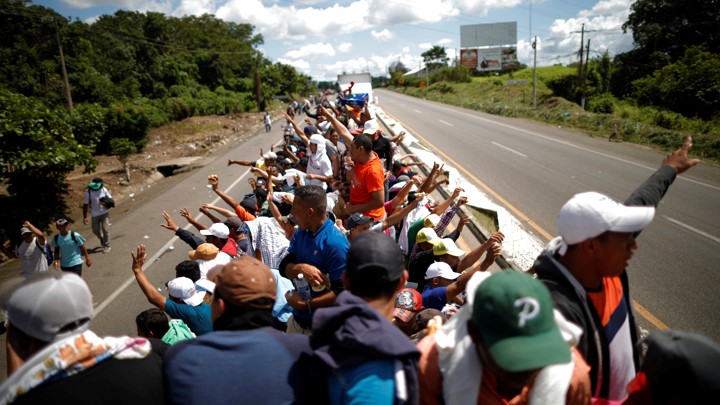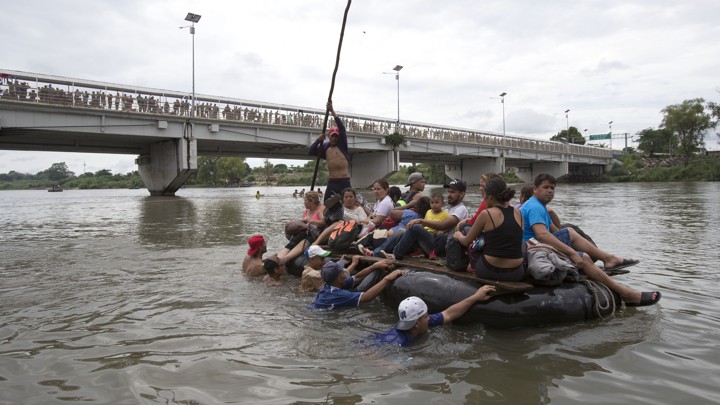I'm NOT a fan of David Frum AT ALL!
...BUT...
DEMOCRATS MUST FIX THIS ISSUE!!! ...or else you'll let the goddamn republicans do it!
The Caravan Challenges the Integrity of U.S. Borders - The Atlantic
...BUT...
DEMOCRATS MUST FIX THIS ISSUE!!! ...or else you'll let the goddamn republicans do it!
The Caravan Challenges the Integrity of U.S. Borders - The Atlantic
The Caravan Is a Challenge to the Integrity of U.S. Borders
If Trump’s opponents stand opposed to policing America’s boundaries, they will not help immigrants—they will only lose votes.
10:32 AM ET

David Frum
Staff writer at The Atlantic

Central American migrants hitchhike on a truck along the highway as they continue their journey in Tapachula, Mexico on October 22, 2018Ueslei Marcelino / Reuters
Short of an election-eve exoneration by Robert Mueller, it would be hard to imagine a nicer October surprise for Donald Trump than an attempt by thousands of unauthorized immigrants to force the borders of the United States. It dramatizes every one of his themes, but none more spectacularly than this: his claim that his opponents will not defend the borders of the United States.
On Sunday, some thousands of people rafted across the Suchiate River, which separates Guatemala from Mexico. Mexico did not detain or expel them, and soon they were on the move again. Organizers seem to hope that the unprecedented mass of the caravan will overawe Mexican and U.S. authorities.
What it is also doing is testing the U.S. political system.
Just as Donald Trump has energized American conservatives to take a harder line on immigration, he’s had the opposite effect on his political opponents. It is, of course, crazy for the president to describe the caravan as “led” by Democrats, as he did in a tweet last week. But he’s not wrong to sense that Democrats are massively discomfited by the caravan. Trump’s tweeting and fulminating and conspiracizing deters any Democratic leader from saying or doing anything that could be interpreted as agreeing with him.
Meanwhile, in the Democrats’ liberal base, the mood toward the caravan is positively sympathetic. The caravan’s slogan, “People without borders,” chimes with the rising sentiment among liberals that border-enforcement is inherently illegitimate, and usually racist, too.
But understand what’s at stake: The theory behind the caravans—this latest, and its smaller predecessors over the past 15 years—is that Central Americans have valid asylum claims in the United States because of the pervasive underemployment and gang-violence problems in their countries. If that claim is true, that is a claim shared not only among the thousands in the current caravan, but the millions back home. A 2013 Pew survey found that 58 percent of Salvadorans would move to the United States if they could. The seven countries of Central America together have a population of some 45 million, or about the same as Mexico’s back in 1970, when the mass migration from that nation began.
Things happen much faster in the 2010s than they did in the 1970s. When Germany temporarily suspended its border rules in August 2015, almost a million migrants surged into the country within the next four months. That surge continued into 2016. Its political effects linger still: It was crucial to the British vote to quit the European Union, to the election of a reactionary government in Poland, to the political revival of Viktor Orbán in Hungary, and to the collapse of center-left parties in France, Italy, Sweden, and Germany.
Trump’s election owes something to the surge across the U.S.’s southern border in the summer of 2014. Tens of thousands of women and children crossed the border in only a few weeks. Many of those who entered in 2014 remain in the United States to this day, even after their cases have been negatively adjudicated, because they have disregarded their removal orders and vanished into the vast U.S. population of unauthorized immigrants.
The strong U.S. job market is again attracting low-wage workers. After a dip in 2017, illegal crossings of the southern border in 2018 have returned to their levels of 2016—and are running well ahead of 2015. If the thousands of people in the caravan successfully cross the border, lodge asylum claims, and are released into the U.S. interior pending adjudication, many more seem likely to follow.
Why wouldn’t they? More than 60 percent of the population of Honduras lives in poverty, according to the World Bank, and very nearly 60 percent do so in Guatemala. While rates of crime and violence have declined in both countries since 2014, they remain appalling by world standards.
For Trump, the caravan represents a political opportunity. Here is exactly the kind of issue that excites more conservative Americans—and empowers him as their blustery, angry champion.
For Trump’s opponents, the caravan represents a trap. Has Trump’s radical nativism so counter-radicalized them that they have internalized the caravan message against any border enforcement at all? If yes, they will not help immigrants. They will only marginalize themselves—and American politics will follow the European path in which anti-immigration parties of the extreme right cannibalize the political center.
If liberals insist that only fascists will defend borders, then voters will hire fascists to do the job liberals will not do. I’ve been pounding the drum for this warning since the European migration crisis accelerated in 2013. The warning holds as true as ever—and now it’s coming home.




